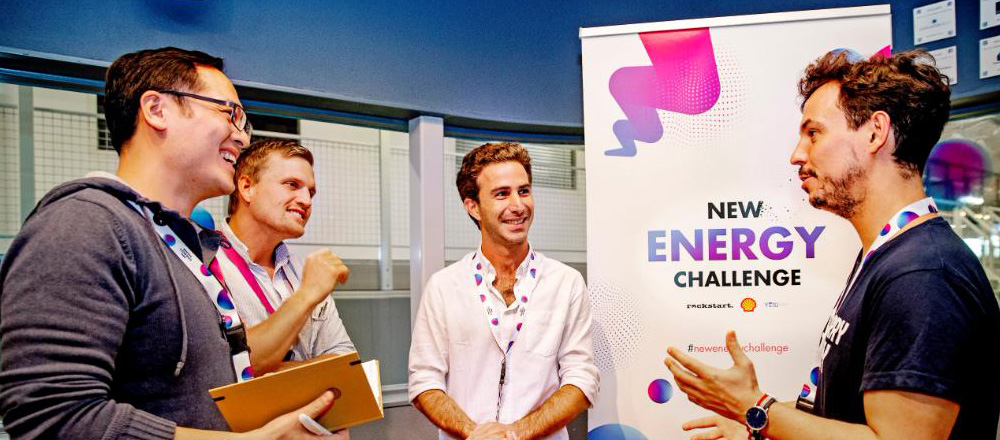Are you ready for the New Energy Challenge?
Win valuable support for your energy innovations
The New Energy Challenge (NEC) helps technology-focused startups and scaleups develop emerging technologies that will promote sustainability and shape the future of the energy sector. Competition finalists will have opportunities to connect with investors and experts to unlock the knowledge, contacts, funding and support they needed to scale their businesses and help drive change.
For NEC 2024, the organisers are seeking innovative proposals in two key areas:
- Industrial energy
With a focus on electrification, demand flexibility and energy forecasting. - Electrochemical battery storage and stationary applications
With a focus on Li-ion battery improvement, non-Li-ion battery technologies and Li-ion battery in-life estimation.
Topic 1: Industrial energy
The energy industry is changing and there is a growing focus on the challenges and opportunities of industrial electrification and power demand flexibility. NEC 24 will give priority to solutions that are designed for industrial processes rather than buildings or residential uses. We want to enhance industrial demand side flexibility and energy forecasting. This involves understanding the unique energy requirements of factories, manufacturing plants and other industrial facilities.
We are particularly interested in:
- Solutions for opportunity evaluation of industrial electrification and demand flexibility: techno-economic modelling tools (including standardized tools) for conceptual design and opportunity evaluation.
- Industrial flex technology ecosystems with an emphasis on those that enhance demand side flexibility and enable more effective integration of renewable energy sources into the grid.
- AI-driven models and algorithms to help optimize energy consumption, reduce carbon emissions, and contribute to the flexibility of the energy ecosystem.
- Fully electrified processes for producing fuel/energy carriers that are based on a renewable feedstock, use renewable power and can help solve the flexibility challenge (intermittency) of operational throughput when renewable electricity from solar or wind sources is used.
- Electrical and thermal energy demand forecasting solutions that can accurately predict load demand and help industries to better plan energy usage and reduce operational costs. Our focus is on heavy industry load and its industrial utilities (electrical and thermal loads).
Topic 2: Innovation in electrochemical battery storage and stationary applications
Li-ion stationary battery systems have been deployed for applications such as high-powered EV charging, trading of green electrons and time-shifting of renewable power generation. Recent advances in stationary battery systems have increased system energy density, cycle life, and/or safety. These improvements represent an evolution in product performance, but we are looking for revolutionary solutions and novel approaches.
We are particularly interested in solutions that either:
- Radically improve one or more of the KPIs in Li-ion batteries, lowering cost or extending the range of applications for which they can be economically deployed, or
- Make use of new, non-Li-ion cell chemistries or architectures that can be scaled to GWh-scale at a price-point compatible with the intended application. For example, in long duration energy storage applications (8+ hours), a levelized cost of storage of ≤€0.05/kWh is often quoted as the price-point for bulk time-shifting of energy.
We are interested in solutions that:
- Enhance the capabilities of materials and components used in Li-ion stationary systems, with the potential to lower capex or total cost of ownership, or to open up new use cases.
- Are based on different (non-Li-ion) chemistries (e.g., sodium, zinc, magnesium, calcium, or other) or different system architectures (high temperature, metal-air, redox flow, or other) and do not compete with Li-ion batteries for raw materials or their supply-chains.
- Improve in-life estimation of Li-ion KPIs (e.g., state-of-charge, state-of-health) and that lead to an accurate forecasting of remaining life, while being flexible enough to cope with different battery dispatching use-case(s) during an asset’s lifetime. Solutions may be software-only, or software–hardware combinations.
Take the next step
The NEC 2024 competition aims to encourage and foster a positive, collaborative environment for rapid and effective development and deployment of new energy technologies. By connecting energy sector startups and scaleups with industry stakeholders our aim is accelerate decarbonization of global energy systems.
The finalists will join a variety of workshops and training sessions during an exciting accelerator programme. They will work with investors and experts during this final phase of the challenge, unlocking knowledge, contacts, and support needed to develop their company and product. The winning companies may be awarded a collaboration or funding to further scale their business
We look forward to seeing your submissions.






